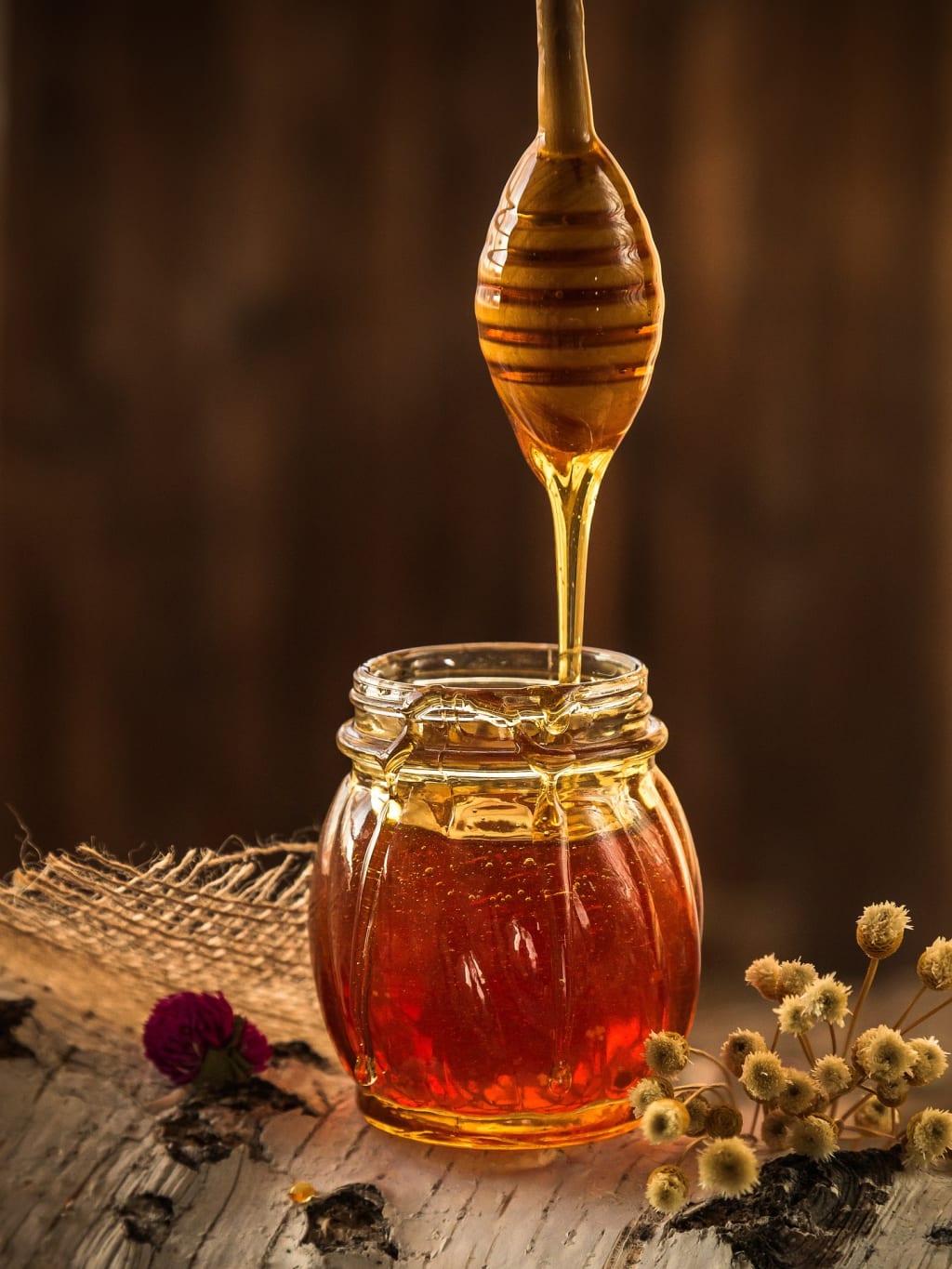Honey: Nature's Sweet Medicine for Health and Wellness
Here's an overview: Introduction to Honey Nutritional Content of Honey Antibacterial and Antimicrobial Properties Honey as a Natural Cough Remedy Benefits of Honey for Skin Honey for Weight Management Honey as a Source of Antioxidants Potential Anti-Inflammatory Effects of Honey Honey for Digestive Health Honey and Wound Healing

Introduction to Honey
Honey, a natural golden syrup produced by honeybees from the nectar of flowers, has been cherished for its sweet taste and medicinal properties for centuries. This exceptional substance is not only a delicious sweetener but also boasts a range of health benefits that have been recognized since ancient times. With its rich history and versatility, honey continues to be a valuable natural remedy for various ailments and a staple in culinary traditions worldwide.
Historical Significance:
Throughout history, honey has held a revered position in various cultures and civilizations. From ancient Egypt and Greece to traditional Ayurvedic medicine in India, honey was considered a precious commodity with healing properties. Its use in religious ceremonies and traditional remedies highlights the deep-rooted significance of honey in human civilization.
Health Benefits:
Honey is not only a natural source of sweetness but also contains antioxidants, vitamins, and minerals that contribute to its therapeutic value. Its antimicrobial properties make it an effective remedy for soothing sore throats and coughs. Honey is also used in skincare for its moisturizing and antibacterial qualities, making it a versatile ingredient in natural beauty products.
Types of Honey:
The flavor, color, and texture of honey can vary depending on the nectar source. Wildflower honey, clover honey, and Manuka honey are just a few examples of the diverse types of honey available, each with its unique taste profile and potential health benefits.
Culinary Uses:
Beyond its medicinal properties, honey is a popular ingredient in cuisines around the world. From drizzling it over pancakes and yogurt to using it as a natural sweetener in baking, honey adds a depth of flavor and complexity to dishes. Its versatility in both sweet and savory recipes makes it a kitchen staple for chefs and home cooks alike.
In the following sections, we will delve deeper into the specific health benefits of honey, including its role in supporting immune health, wound healing, and promoting overall well-being.
Nutritional Content of Honey
Honey is composed mainly of carbohydrates, such as fructose, glucose, and sucrose, making it a natural sweetener with a lower glycemic index compared to refined sugar.
It also contains small amounts of proteins, amino acids, vitamins (including vitamin C, B vitamins), minerals (such as calcium, iron, potassium), enzymes, and antioxidants.
The exact composition of honey can vary based on the floral source from which bees collect nectar.
The presence of antioxidants in honey, such as flavonoids and phenolic acids, contribute to its potential health benefits.
Honey is free from fat and cholesterol, making it a healthy alternative to other sweeteners.
Some research suggests that honey may have antibacterial, antifungal, and anti-inflammatory properties, which can support overall health and well-being.
It is important to note that while honey does contain beneficial nutrients, it should still be consumed in moderation due to its high sugar content.
Honey offers not only a natural sweetness but also a range of potential health benefits due to its diverse nutritional profile.
Antibacterial and Antimicrobial Properties
Honey has been recognized for its antibacterial and antimicrobial properties for centuries. These properties make honey an effective natural remedy for various health issues:
Antibacterial: Honey's high sugar content creates an environment where bacteria struggle to survive. Additionally, honey produces hydrogen peroxide, which helps kill bacteria.
Antimicrobial: Honey contains substances like bee defensin-1, which has antimicrobial properties, inhibiting the growth of certain bacteria.
Manuka honey: This type of honey, produced in New Zealand, is particularly renowned for its potent antibacterial qualities. It contains a compound called methylglyoxal, which contributes to its high antibacterial potency.
Wound healing: The antibacterial properties of honey make it an excellent choice for wound management. It can help prevent infections and promote faster healing of cuts, burns, and sores.
Throat infections: Honey's antimicrobial effects can soothe a sore throat and help fight off infections.
Digestive health: Consuming honey may also promote a healthy digestive system by inhibiting the growth of harmful bacteria in the gut.
In conclusion, honey's antibacterial and antimicrobial properties are key factors in its widespread use as a natural healing agent. Whether applied topically or consumed as part of a healthy diet, honey offers numerous health benefits due to these remarkable properties.
Honey as a Natural Cough Remedy
Honey has been valued for its medicinal properties for centuries, and one of its well-known benefits is its effectiveness as a natural cough remedy. Here are some key points to consider:
Soothes Throat: The thick consistency of honey helps coat the throat, providing relief from irritation and soothing cough symptoms.
Antibacterial Properties: Honey has natural antibacterial properties that can help fight off the bacteria causing the cough, making it an effective remedy for both dry and productive coughs.
Reduces Coughing Frequency: Consuming honey can help reduce the frequency of coughing fits, allowing for a more restful night's sleep and better overall recovery.
Rich in Antioxidants: The antioxidants present in honey can help strengthen the immune system, aiding in the body's natural defense against cough and cold viruses.
Safe for Children: Honey is a safe and natural cough remedy for children over the age of one. It can be particularly useful for soothing nighttime coughs in young ones.
Versatile Use: Honey can be consumed on its own or mixed with warm water, lemon, or herbal teas to enhance its cough-relieving properties.
Caution for Infants: It is important to note that honey should not be given to infants under one year of age due to the risk of botulism.
Incorporating honey into your cough management routine can provide natural relief without the side effects often associated with over-the-counter cough medications.
Benefits of Honey for Skin
Moisturizes and Nourishes: Honey is a natural humectant, which means it attracts and retains moisture. This helps to hydrate and moisturize the skin, leaving it soft and supple.
Antibacterial Properties: The antibacterial properties of honey can help to prevent and treat acne by reducing the growth of acne-causing bacteria on the skin.
Antioxidant Benefits: Honey is rich in antioxidants, which can help to protect the skin from damage caused by free radicals. This can help to slow down the aging process and keep the skin looking youthful.
Healing Properties: Honey has been used for centuries for its healing properties. It can help to soothe and heal wounds, burns, and other skin irritations.
Exfoliation: The enzymes in honey make it a gentle exfoliator, helping to remove dead skin cells and promote new cell growth.
Brightens Complexion: Regular use of honey can help to brighten the skin, giving it a healthy glow and even tone.
Reduces Inflammation: Honey has anti-inflammatory properties that can help to calm and soothe irritated skin, making it beneficial for conditions like eczema and psoriasis.
Balances Skin pH: Honey helps to balance the pH of the skin, maintaining its natural protective barrier and preventing issues like dryness and sensitivity.
Honey is a versatile and natural ingredient that can benefit the skin in numerous ways, making it a valuable addition to any skincare routine.
Honey for Weight Management
Honey can be a beneficial part of a weight management plan due to its unique composition.
This natural sweetener is lower on the glycemic index compared to regular sugar, meaning it may lead to better blood sugar control and less of an insulin spike after consumption.
One study suggested that replacing sugar with honey could lead to lower weight gain and body fat compared to consuming sugar.
The combination of fructose and glucose in honey can provide a more sustained energy release compared to refined sugar, potentially aiding in longer-lasting satiety.
Honey's naturally occurring enzymes and antioxidants may also support metabolism and overall health.
When incorporating honey into a diet for weight management, moderation is key due to its calorie content.
Using honey as a substitute for processed sugars in recipes can be a healthier option, but portion control is still essential.
Incorporating honey mindfully into a balanced diet, along with regular physical activity, could aid in weight management efforts.
Honey as a Source of Antioxidants
Honey is a natural sweetener that also offers a variety of health benefits.
One of the key benefits of honey is its high antioxidant content.
Antioxidants help to neutralize harmful free radicals in the body, which can contribute to various chronic diseases.
The antioxidants found in honey include flavonoids, phenolic acids, and enzymes.
These antioxidants play a crucial role in protecting cells from oxidative stress and reducing inflammation.
Studies have shown that consuming honey regularly can increase the levels of antioxidants in the body, offering protection against oxidative damage.
Darker varieties of honey, such as buckwheat or manuka honey, tend to have higher antioxidant levels compared to lighter varieties.
Including honey in your diet can be a simple way to boost your antioxidant intake and support overall health.
The combination of antioxidants and other beneficial compounds in honey makes it a valuable addition to a balanced diet.
Choosing raw, unprocessed honey ensures that you are getting the maximum antioxidant benefits from this natural sweetener.
Potential Anti-Inflammatory Effects of Honey
Honey has been recognized for its potential anti-inflammatory properties, making it a promising natural remedy for various inflammatory conditions. Here are some of the ways in which honey may exhibit anti-inflammatory effects:
Antioxidant Content: Honey contains antioxidants such as flavonoids and phenolic compounds, which can help reduce inflammation by neutralizing free radicals in the body.
Enzymatic Activity: Honey's enzymatic activity, particularly from the glucose oxidase enzyme, can produce hydrogen peroxide, which has antimicrobial properties and aids in reducing inflammation.
Phytochemicals: Certain phytochemicals found in honey, such as quercetin and caffeic acid, have been shown to possess anti-inflammatory properties by inhibiting inflammatory mediators.
Wound Healing: The anti-inflammatory effects of honey can also aid in wound healing by reducing swelling and redness, promoting tissue repair, and preventing infection.
Gut Health: In conditions like gastritis and inflammatory bowel disease, honey's anti-inflammatory properties may help soothe the gastrointestinal tract and promote healing.
Studies have shown that the consumption of honey may help reduce markers of inflammation in the body, such as C-reactive protein (CRP) and interleukin-6 (IL-6), indicating its potential role in managing inflammatory conditions. Incorporating honey into your diet or using it topically as part of a skincare regimen may harness its anti-inflammatory benefits, contributing to overall health and wellness.
Honey for Digestive Health
Honey has been used for centuries as a natural remedy to support digestive health. Here are some key points to consider:
Soothing Effects: Honey contains anti-inflammatory properties that can help soothe the digestive system. It may help alleviate symptoms of gastrointestinal issues such as gastritis or indigestion.
Prebiotic Benefits: Certain types of honey, particularly raw and unfiltered varieties, contain prebiotics that serve as food for the beneficial bacteria in the gut. This can help promote a healthy balance of gut flora and improve digestion.
Antimicrobial Properties: Raw honey has natural antimicrobial properties that can help fight off harmful bacteria in the digestive tract, potentially reducing the risk of infections or digestive issues.
Relief for Acid Reflux: Some people find relief from acid reflux symptoms by consuming honey. It is believed that honey can help coat the esophagus and reduce the burning sensation associated with reflux.
Constipation Relief: Honey can act as a mild laxative and aid in relieving constipation. Consuming a teaspoon of honey with warm water can help promote bowel movements and alleviate discomfort.
Incorporating honey into your diet in moderation can be a flavorful way to support your digestive health naturally. Remember to choose raw and unprocessed honey for maximum benefits.
Honey and Wound Healing
Honey has been used for centuries as a natural remedy for wound healing, thanks to its antimicrobial and anti-inflammatory properties. Here are some key points to consider regarding honey's effectiveness in wound healing:
Antimicrobial Properties: Honey has natural antibacterial properties, primarily due to its high sugar content and low pH level. This helps create an environment that is unfavorable for bacteria growth, thus preventing infection in wounds.
Anti-Inflammatory Effects: The anti-inflammatory properties of honey help reduce swelling, pain, and redness in wounds. This can promote faster healing and alleviate discomfort associated with the wound.
Promotes Tissue Regeneration: Honey is known to help stimulate tissue regeneration and collagen synthesis, aiding in the healing process of wounds. It can also help in the formation of new blood vessels, essential for proper wound healing.
Moist Wound Healing: Honey creates a moist environment when applied to wounds, which is believed to facilitate the healing process. This prevents the wound from drying out and helps in the removal of dead tissue, promoting faster healing.
Treatment of Chronic Wounds: Honey has shown promising results in the treatment of chronic wounds like diabetic ulcers, pressure sores, and burns. Its healing properties can help in resolving these difficult-to-treat wounds effectively.
In conclusion, honey's natural properties make it a valuable resource in wound healing. Its effectiveness, coupled with its availability and ease of use, make it a compelling option for promoting healing and overall wellness.






Comments
There are no comments for this story
Be the first to respond and start the conversation.